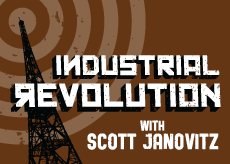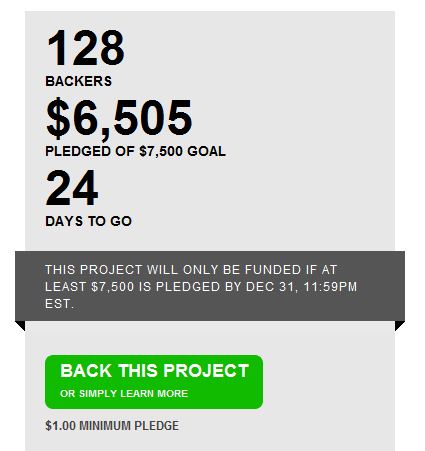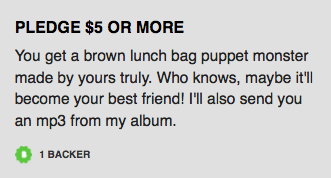Industrial Revolution: Kickstarter Fatigue
posted in: Features
 The artist funding platform Kickstarter is estimated to have injected $13 million into what is being called the new music economy over the span of the two years since the site’s launch.
The artist funding platform Kickstarter is estimated to have injected $13 million into what is being called the new music economy over the span of the two years since the site’s launch.
Kickstarter is based on a fairly recent economic model called micro-financing, whereby would-be entrepreneurs who otherwise lack access to capital are funded in small increments by a number of investors, who make a relatively low-risk investment. With Kickstarter, the recipients are artists, including musicians, filmmakers, and others, who offer various concrete rewards to investors, rather than a percentage of profit. An artist might offer memorabilia or merchandise related to the project at hand in proportion to the level of the pledge. The highest donations rarely exceed the low thousands of dollars and are more often in the $300 and under range.

That Kickstarter has fostered so much commerce exchange to the benefit of DIY artists speaks to the popularity of the model and reflects the development of this new music economy, which works outside of traditional suppliers of capital. Kickstarter’s initial success owes much to the novelty of applying a micro-finance model to musicians”fans saw a way they could become directly involved in the creative productions of artists they knew and/or liked.
As good and unique ideas tend to go, many more artists latched on and began using the platform to fund their own projects. Kickstarter, from a sociological standpoint, had tipped. But in terms of what it can do for musicians, Kickstarter’s moment of cultural pervasion has now become over-saturation. What was at first an obscure, invite-only avenue to make an art project into reality has lost the novelty factor, and is now in fact open to anyone who wishes to use it, whether they have a unique project or they’re another indie band just trying to scrape together enough dough to duplicate some CDs. Kickstarter has become little more than a too-familiar dot on the Facebook wall, easily dismissed. How many of your friend’s bands do you really like enough to want to help, especially when they can’t offer much beyond an advance copy of the album? And the backlash from those targeted has already begun, with public laments of being pitched by artists no more broke than they are.
Artist funding sites like Kickstarter are still of great use, both for filmmakers and artists with unique projects and for musicians of a certain level, who have already-engaged fans eager to be part of the process. The average unknown band who, in the early days of Kickstarter, could really benefit from such an interesting and unknown platform, are now spinning their wheels, struggling to meet their pre-set goal. (If users fail to meet a minimum amount of pledges, they don’t get anything”this is a motivating factor to investors.)

Let's Make A Deal!
For Kickstarter, this means that this segment of users will surely level off. The question is whether they can focus on building other segments up so that non-band projects become part of their brand identity”art, originality, and success, as opposed to the stigma of countless bands all trying to achieve the same goal from, and this is key, the same audience. Kickstarter works in the long-term only when projects cross-pollinate and users fund several of them in small amounts. A look at the Kickstarter front page at press time indicates such awareness, with featured projects such as a TV series, an X-Files-inspired musical, boutique mustard distribution, comic books, photography¦ there isn’t a single featured musical project. Meanwhile, the organization faces competition from similar sites, like Slicethepie, Sellaband and PledgeMusic. The latter offers an additional charity component, and the former two are both devoted strictly to music projects.

I'll take just the puppet, please.
Unless artists have something truly valuable to offer, or are speaking to a dedicated fan-base, they’d best think hard before launching a Kickstarter campaign. All this is not to say that it can’t be done successfully, but bands must be aware of the environment in which requests for pledges will be received, know their limitations, be creative, target carefully and work hard. OurStage is doing its part by highlighting some artists doing just that in our Kickstart OurHeart feature.
